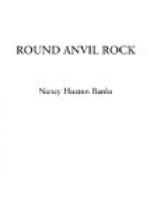The man of conscience, who cares for the bodies of his kind, bears almost as heavy a burden as he who cares for their souls. He must everywhere, and unrestingly, fight ignorance and prejudice with one hand, while he strives to heal with the other, and this double strife was fiercer in the wilderness, just at that time, than almost anywhere else within the furthest reach of science. On first coming he had found more people being killed by calomel and jalap than by the plague. At every turn he encountered this bane of the country which was called callomy-jallopy, and at that moment he was utterly worn out, body and soul, by a struggle to save the life of a man who had ignorantly poisoned himself by drinking some acid after taking the dose. This was not his first experience of the kind; but he had met the other trials with the high courage of a light heart and a free mind. It was only within the last two days that he had been weighed down by discouragement, by heaviness of heart, and depression of mind. He was so weary and absorbed now in disheartened thought, that he did not hear Toby’s approach, and he was startled when Father Orin appeared in the open door. He greeted him with a warmly outstretched hand, but did not say that he was glad to see him; they were too good friends for empty phrases, such good friends that they sat down silently, neither needing a word to know the other’s sadness. It was the priest who finally broke the silence.
“You are troubled, my son,” he said, quietly and gently. “I see there is something besides the trouble which touches us all—this terror of what is coming on the other side of the river. I see that there is something else—some closer trouble of your own. If you wish to tell me about it, I will do what I can to help you; but you know this without being told.”
He had spoken at the right moment, for there are moments in the lives of the most reserved and self-reliant when the heart must speak to ease the mind. Paul Colbert was a Protestant, and so firm and strong in his faith that he was ready at all times to defend it, to fight for it; yet this moment, which has nothing to do with any creed, had come to him, and he spoke as one man speaks to another whom he trusts and knows to be his friend. He told what he was suffering, and the cause of his wretchedness. He spoke of his first meeting with Ruth, and of the love for her that had leapt up in his heart at the first glimpse of her face, before he had heard her voice, before he knew her name. He said how happy he was when chance put her in his arms through that wild night’s ride. He described his visit to her on the next day, and said how far he was from suspecting that William Pressley was more than a member of the same family. He went on to speak of the other visits which he had paid to Ruth, telling how fast his love had grown with every meeting. He ended with the revelation at the dance in the woods.




